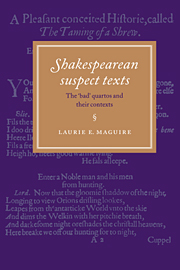5 - Memory
Published online by Cambridge University Press: 19 October 2009
Summary
If any one faculty of our nature may be called more wonderful than the rest, I do think it is memory. There seems something more speakingly incomprehensible in the powers, the failures, the inequalities of memory, than in any other of our intelligences. The memory is sometimes so retentive, so serviceable, so obedient – at others, so bewildered and so weak – and at others again, so tyrannic, so beyond controul! – We are to be sure a miracle every way – but our powers of recollecting and of forgetting, do seem peculiarly past finding out.
Jane Austen, Mansfield Park (1814) vol.11, chapter 4ORAL CULTURE
Elizabethan England was not a ‘primary oral’ culture in the sense that Homeric Greece was with its dependence on transmitting material (legal, historical, poetic) memorially from one mind to another. Sixteenth-century England was ‘residually oral’; a society in transition, en route to becoming a documentary society, it nonetheless had very strong roots in the oral world, whether through habit, illiteracy, or expense of paper. Aides-mémoire abounded, but they were, literally, what the noun suggests: aids to memory, not a substitute for it. So important was memory to the culture that numerous systems existed for stretching its capacity and enhancing its accuracy. In dealing with the subject of memorial reconstruction we must acknowledge that actors were not the only people with trained and efficient memories.
Walter Ong has suggested that we can measure the degree of residual orality in a chirographic culture from the emphasis accorded memory in its education system.
- Type
- Chapter
- Information
- Shakespearean Suspect TextsThe 'Bad' Quartos and their Contexts, pp. 113 - 148Publisher: Cambridge University PressPrint publication year: 1996

